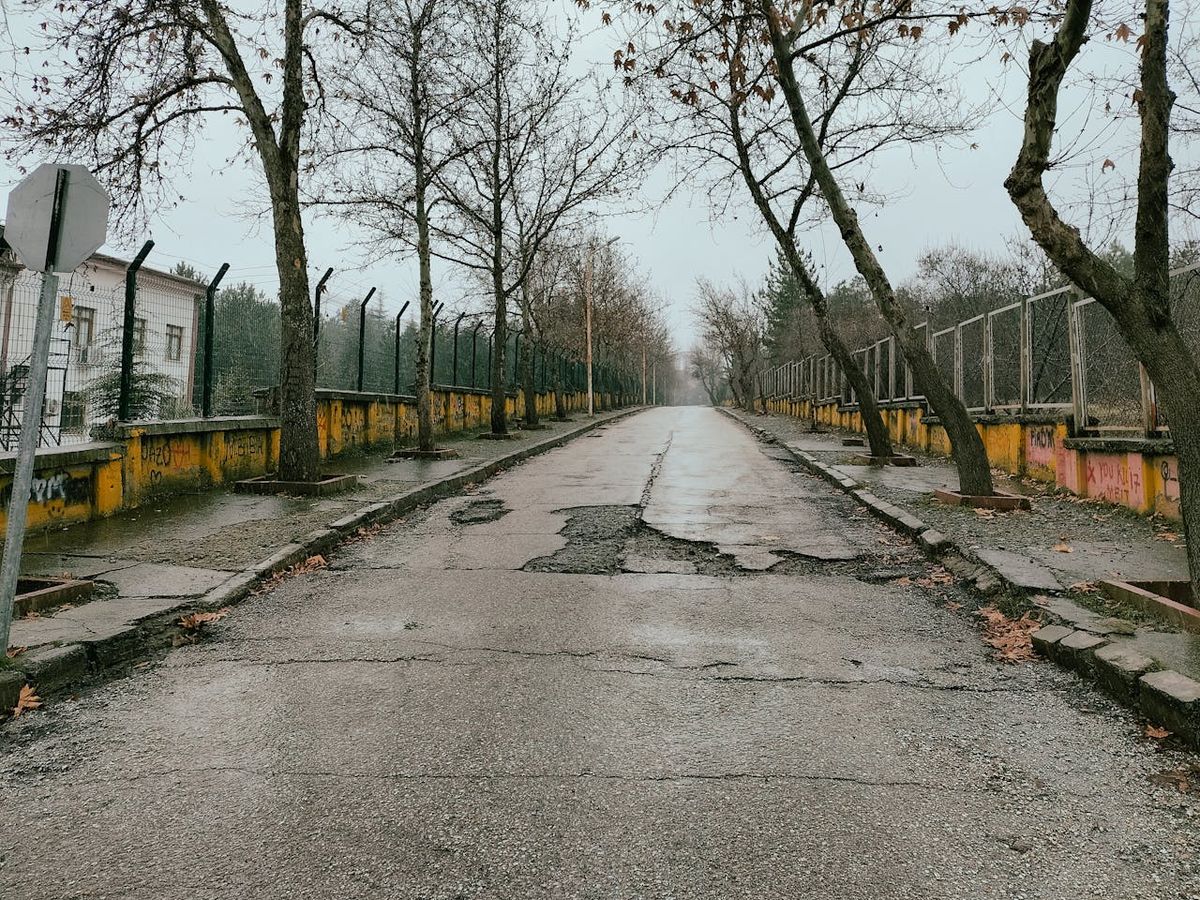
Dangerous Road Conditions
Protecting Your Rights When Road Defects Cause Tennessee Accidents
When Roads Become Hazards
Roads should be safe for travel, but dangerous conditions can turn routine drives into disaster. If you've been injured in an accident caused by defective roads, inadequate signage, poor maintenance, or construction zone hazards in Tennessee, you may have a claim against the government entity responsible for road maintenance.
These cases are complex and require quick action due to strict notice requirements and special procedures for suing government entities.
Dangerous road condition accidents are a serious type of traffic accident in Tennessee. Our attorneys also handle related cases including car accidents and truck accidents.
What Counts as Dangerous Road Conditions?
Dangerous road conditions that can cause accidents include:
Surface Defects:
- Potholes and pavement deterioration
- Uneven surfaces and drop-offs
- Cracked or broken pavement
- Missing or loose manhole covers
Drainage Issues:
- Standing water and flooding
- Inadequate storm drains
- Ice accumulation in problem areas
- Washouts and erosion
Design Defects:
- Inadequate banking on curves
- Poor sight lines and visibility issues
- Insufficient merge lanes
- Dangerous intersections
Maintenance Failures:
- Overgrown vegetation blocking signs or views
- Debris and fallen trees not cleared
- Snow and ice removal negligence
- Guardrail and barrier damage
Signage and Marking Problems:
- Missing or obscured traffic signs
- Faded or missing lane markings
- Inadequate warning signs for hazards
- Broken or non-functioning traffic signals
Construction Zone Hazards:
- Inadequate warning signs and barriers
- Poor traffic control in work zones
- Unsafe lane shifts and merges
- Debris and equipment left on roadways
Tennessee Road Maintenance Responsibilities
Different government entities are responsible for different roads:
Tennessee Department of Transportation (TDOT):
- Interstate highways (I-40, I-65, I-75, I-24, I-81)
- U.S. highways and state routes
- Major bridges and overpasses
County Governments:
- County roads and rural routes
- Some bridges and local highways
- Secondary road maintenance
City and Municipal Governments:
- City streets and local roads
- Traffic signals and signs
- Municipal bridges and overpasses
Understanding which entity is responsible is crucial for filing proper claims and meeting notice requirements.
Tennessee Government Liability Laws
Suing government entities for dangerous road conditions involves special rules:
Tennessee Governmental Tort Liability Act:
- Government entities can be liable for negligent road maintenance
- Must prove the entity had actual or constructive notice of the hazard
- Different rules apply to different types of government functions
Notice Requirements:
- 60 days to provide written notice to government entities for most claims
- Notice must describe the accident, injuries, and claimed damages
- Failure to provide timely notice can bar your claim entirely
Statute of Limitations:
- One year from date of accident (same as other personal injury claims)
- But 60-day notice requirement comes first
Immunity Exceptions:
- Government immunity doesn't apply to negligent road maintenance
- Discretionary function immunity for policy decisions
- Emergency response immunity in some situations
Common Types of Road Condition Accidents
Single Vehicle Accidents:
- Hitting potholes causing loss of control
- Hydroplaning on flooded roadways
- Running off road due to missing guardrails
- Tire damage from debris or road defects
Multi-Vehicle Accidents:
- Rear-end collisions from sudden stops for hazards
- Head-on crashes from poor road design
- Intersection accidents from malfunctioning signals
- Construction zone pileups
Motorcycle and Bicycle Accidents:
- Particularly vulnerable to road surface defects
- Gravel and debris causing loss of control
- Uneven pavement and potholes
- Poor visibility from overgrown vegetation
Proving a Tennessee Road Defect Case
To succeed in a dangerous road conditions case, you must prove:
Dangerous Condition:
- The road condition created an unreasonable risk of harm
- The condition was not obvious to ordinary drivers
- Normal driving could not avoid the hazard
Notice to Government:
- The government entity knew about the hazard (actual notice)
- OR should have known through reasonable inspection (constructive notice)
- OR the government created the hazard
Causation:
- The dangerous condition caused or substantially contributed to your accident
- Your injuries resulted from the accident
No Comparative Fault Bar:
- You were not 50% or more at fault for the accident
- Reasonable driving behavior given the circumstances
Challenges in Road Defect Cases
Notice Issues:
- Proving government knew or should have known about the hazard
- Obtaining maintenance and inspection records
- Finding prior complaints or accident reports
Causation Problems:
- Distinguishing road defect from driver error
- Weather and visibility factors
- Other contributing causes to the accident
Government Defenses:
- Claiming immunity for discretionary decisions
- Arguing the hazard was obvious
- Blaming driver behavior or vehicle defects
- Disputing notice or knowledge of the condition
Evidence Preservation:
- Road conditions may be repaired quickly after accidents
- Weather can change surface conditions
- Traffic patterns and visibility change over time
What Compensation Can You Recover?
Tennessee road defect accident victims may be entitled to:
Economic damages:
- Medical expenses and hospitalization
- Vehicle repair or replacement costs
- Lost wages and reduced earning capacity
- Future medical care and rehabilitation
- Property damage to personal belongings
Non-economic damages:
- Pain and suffering from injuries
- Emotional distress and trauma
- Loss of enjoyment of life
- Permanent disability and disfigurement
- Loss of consortium for spouses
Limitations on damages:
- Some Tennessee statutes may cap damages against government entities
- Insurance coverage limits may apply
- Comparative fault reduces recovery
Steps to Take After a Road Defect Accident
Immediate actions:
- Seek medical attention for all injuries
- Call police to document the accident
- Take extensive photos of the road condition, your vehicle, and the scene
- Measure and document the defect size and location
- Get witness information if anyone saw the accident
- Note weather and lighting conditions
Critical follow-up within 60 days:
- File written notice with the appropriate government entity
- Contact an attorney immediately to ensure proper notice
- Preserve all evidence including damaged vehicle parts
- Document ongoing medical treatment and expenses
Investigation needs:
- Identify which government entity is responsible
- Obtain maintenance records and prior complaints
- Research similar accidents at the same location
- Gather expert opinions on road design and maintenance standards
The 60-Day Notice Requirement
Tennessee's notice requirement is strict and unforgiving:
What the notice must include:
- Date, time, and location of accident
- Description of the dangerous condition
- Description of injuries and damages
- Contact information for claimant
Where to send notice:
- Appropriate government entity (state, county, or city)
- Usually to the risk management or legal department
- Certified mail with return receipt recommended
Consequences of late notice:
- Your claim may be barred entirely
- Very limited exceptions for late notice
- Courts strictly enforce this requirement
Why Professional Legal Help Is Essential
Road defect cases against government entities are among the most complex personal injury claims:
Strict procedural requirements:
- 60-day notice requirement
- Special rules for government liability
- Complex jurisdiction and venue issues
Difficult liability determinations:
- Proving government knowledge of hazards
- Obtaining government records and documents
- Understanding maintenance standards and practices
Resource requirements:
- Expert witnesses for road design and engineering
- Accident reconstruction specialists
- Government law and procedure expertise
Time pressures:
- 60-day notice deadline
- One-year statute of limitations
- Evidence preservation requirements
Frequently Asked Questions About Tennessee Road Defect Claims
How long do I have to notify the government about my road defect accident?
Tennessee requires written notice to government entities within 60 days of the accident. Missing this deadline can permanently bar your claim, regardless of how strong your case might be.
Can I sue the government for road defects in Tennessee?
Yes, Tennessee's Governmental Tort Liability Act allows claims against government entities for negligent road maintenance, but strict notice requirements and special procedures apply.
What if the road defect was obvious?
If a road defect was obvious and avoidable, it may affect your case. However, many defects that seem obvious in daylight may not be visible at night or in poor weather conditions.
How do I know which government entity is responsible for the road?
This depends on the type of road: TDOT for interstates and state highways, counties for rural roads, and cities for municipal streets. An attorney can help identify the correct entity and ensure proper notice.
Don't Let Government Entities Escape Responsibility
Road defect cases require immediate action and specialized expertise to navigate complex government liability laws. Don't let bureaucracy prevent you from getting the compensation you deserve for injuries caused by dangerous road conditions.
Contact AskLitigation immediately for a free consultation. We understand Tennessee government liability law and will ensure all notice requirements are met while building the strongest possible case for your injuries.
Remember: You have only 60 days to provide notice to government entities. Call today—every day matters in protecting your rights.
Browse Articles for "Dangerous Road Conditions" in Tennessee:
Start Your FREE Consultation
Complete the form for a Free Consultation. No upfront fees, swift action, and we’re only paid when we succeed for you.
Ask Us If You Qualify
We’re here to help you take on your fight—whether it’s a car accident, a dangerous drug, or a workplace injury gone wrong. One call starts it all, and we’re with you every step, no upfront cost required.
- Free Case Review
- No Fees Until Victory
- Millions Recovered
- Personal Strategy
- California Coverage
- Relentless Case Pursuit

